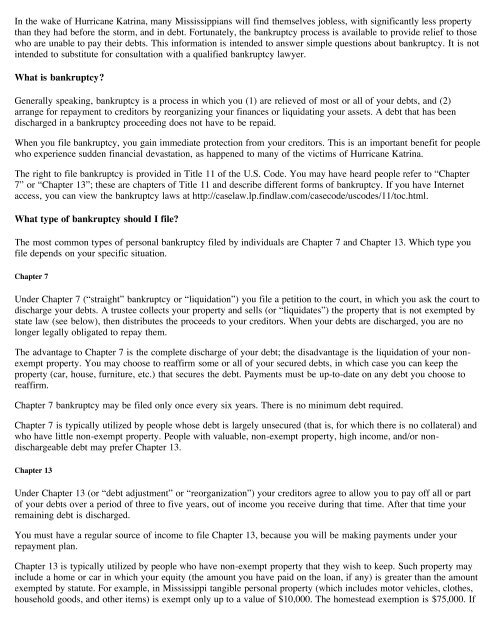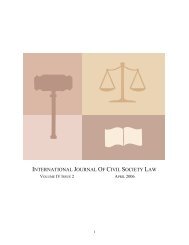Hurricane Katrina: Legal Issues - Columbus School of Law
Hurricane Katrina: Legal Issues - Columbus School of Law
Hurricane Katrina: Legal Issues - Columbus School of Law
You also want an ePaper? Increase the reach of your titles
YUMPU automatically turns print PDFs into web optimized ePapers that Google loves.
In the wake <strong>of</strong> <strong>Hurricane</strong> <strong>Katrina</strong>, many Mississippians will find themselves jobless, with significantly less property<br />
than they had before the storm, and in debt. Fortunately, the bankruptcy process is available to provide relief to those<br />
who are unable to pay their debts. This information is intended to answer simple questions about bankruptcy. It is not<br />
intended to substitute for consultation with a qualified bankruptcy lawyer.<br />
What is bankruptcy?<br />
Generally speaking, bankruptcy is a process in which you (1) are relieved <strong>of</strong> most or all <strong>of</strong> your debts, and (2)<br />
arrange for repayment to creditors by reorganizing your finances or liquidating your assets. A debt that has been<br />
discharged in a bankruptcy proceeding does not have to be repaid.<br />
When you file bankruptcy, you gain immediate protection from your creditors. This is an important benefit for people<br />
who experience sudden financial devastation, as happened to many <strong>of</strong> the victims <strong>of</strong> <strong>Hurricane</strong> <strong>Katrina</strong>.<br />
The right to file bankruptcy is provided in Title 11 <strong>of</strong> the U.S. Code. You may have heard people refer to “Chapter<br />
7” or “Chapter 13”; these are chapters <strong>of</strong> Title 11 and describe different forms <strong>of</strong> bankruptcy. If you have Internet<br />
access, you can view the bankruptcy laws at http://caselaw.lp.findlaw.com/casecode/uscodes/11/toc.html.<br />
What type <strong>of</strong> bankruptcy should I file?<br />
The most common types <strong>of</strong> personal bankruptcy filed by individuals are Chapter 7 and Chapter 13. Which type you<br />
file depends on your specific situation.<br />
Chapter 7<br />
Under Chapter 7 (“straight” bankruptcy or “liquidation”) you file a petition to the court, in which you ask the court to<br />
discharge your debts. A trustee collects your property and sells (or “liquidates”) the property that is not exempted by<br />
state law (see below), then distributes the proceeds to your creditors. When your debts are discharged, you are no<br />
longer legally obligated to repay them.<br />
The advantage to Chapter 7 is the complete discharge <strong>of</strong> your debt; the disadvantage is the liquidation <strong>of</strong> your nonexempt<br />
property. You may choose to reaffirm some or all <strong>of</strong> your secured debts, in which case you can keep the<br />
property (car, house, furniture, etc.) that secures the debt. Payments must be up-to-date on any debt you choose to<br />
reaffirm.<br />
Chapter 7 bankruptcy may be filed only once every six years. There is no minimum debt required.<br />
Chapter 7 is typically utilized by people whose debt is largely unsecured (that is, for which there is no collateral) and<br />
who have little non-exempt property. People with valuable, non-exempt property, high income, and/or nondischargeable<br />
debt may prefer Chapter 13.<br />
Chapter 13<br />
Under Chapter 13 (or “debt adjustment” or “reorganization”) your creditors agree to allow you to pay <strong>of</strong>f all or part<br />
<strong>of</strong> your debts over a period <strong>of</strong> three to five years, out <strong>of</strong> income you receive during that time. After that time your<br />
remaining debt is discharged.<br />
You must have a regular source <strong>of</strong> income to file Chapter 13, because you will be making payments under your<br />
repayment plan.<br />
Chapter 13 is typically utilized by people who have non-exempt property that they wish to keep. Such property may<br />
include a home or car in which your equity (the amount you have paid on the loan, if any) is greater than the amount<br />
exempted by statute. For example, in Mississippi tangible personal property (which includes motor vehicles, clothes,<br />
household goods, and other items) is exempt only up to a value <strong>of</strong> $10,000. The homestead exemption is $75,000. If

















